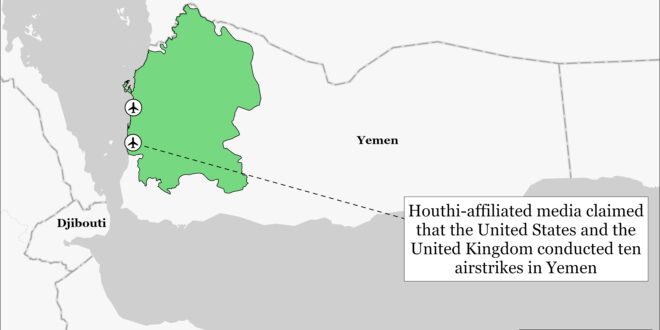Israeli forces conducted a “high-precision operation” at al Shifa Hospital on March 18 based on intelligence that Hamas was using it for militant activity.[i] The Israel Defense Forces (IDF) reported that they had intelligence that senior Hamas officials were using the area to conduct and direct attacks in the Gaza Strip.[ii] Israeli ground forces advanced to the hospital with bulldozers and tanks and detained more than 200 Palestinians.[iii] Palestinian militias, including Hamas, engaged Israeli forces around al Shifa Hospital during the operation.[iv]
Israeli forces killed Faiq al Mabhouh, who is a senior official in the Hamas-run Interior Ministry, during the operation.[v] The IDF said that Mabhouh was the head of Hamas’ “Operations Directorate of the Internal Security Service,” while Hamas said that he was the “director of central operations of the Palestinian Police in Gaza.”[vi] The Civil Police and the Interior Ministry‘s Internal Security Forces both employ fighters from the Hamas military wing.[vii] The IDF has warned that all members of “the Hamas apparatus,” including Hamas police officers, are legitimate targets during IDF operations in the Gaza Strip.[viii] Mabhouh’s brother, Mahmoud Mabhouh, was a prominent figure in Hamas’ military wing, and Israel likely killed him in 2010.[ix]
Hamas’ infiltration into the al Shifa Hospital area after Israel’s initial clearing operation highlights Hamas’ efforts to reestablish itself in the northern Gaza Strip. Israeli forces initially expanded clearing operations to al Shifa Hospital in November 2023, targeting a Hamas tunnel network underneath the hospital.[x] Hamas has sought to reconstitute militarily and rebuild its governing authority in the northern Gaza Strip since Israeli forces reduced their presence there in December 2023. Israeli Army Radio reported in January 2024 that the Israeli military establishment believes that Hamas is trying to restore its control over the civilian population in the northern Gaza Strip partly by rehabilitating local police there.[xi]
Syrian Defense Minister Ali Mahmoud Abbas traveled to Tehran on March 16 to discuss military cooperation with senior Iranian officials. Abbas met with Iranian Defense and Armed Forces Logistics Minister Brig. Gen. Mohammad Reza Gharaei Ashtiani, Supreme National Security Council Secretary Brig. Gen. Ali Akbar Ahmadian, and Armed Forces General Staff Chief Maj. Gen. Mohammad Bagheri from March 17 to 18.[xii]
Abbas may have discussed Iran transferring air defense systems to Syria during his meetings. Abbas discussed recent Israeli airstrikes in Syria and how to counter them, among other issues. Iranian leaders have sought in recent years to build an integrated air defense network in Syria that could repel Israeli airstrikes and thereby help Iran entrench itself militarily in Syria.[xiii] The meetings with Ashtiani and Bagheri are particularly noteworthy in this context. Ashtiani, as defense minister, is primarily responsible for managing arms procurement and sales as well as the Iranian defense industrial base. Bagheri has previously pursued expanding air defense cooperation with Syria.
Key Takeaways:
- Gaza Strip: Israeli forces conducted a “high-precision operation” at al Shifa Hospital based on intelligence that Hamas was using it for militant activity.
- Syria: Syrian Defense Minister Ali Mahmoud Abbas traveled to Tehran to discuss military cooperation with senior Iranian officials.
- West Bank: Israeli police have conducted training exercises in recent weeks to prepare for possible Palestinian militia attacks into Israeli settlements in the West Bank.
- Southern Lebanon and Golan Heights: The Islamic Resistance in Iraq claimed a one-way drone attack targeting an unspecified Israeli airbase in the Golan Heights.
- Yemen: Houthi-affiliated media claimed that the United States and the United Kingdom conducted 10 airstrikes targeting two Houthi-controlled areas in Yemen.
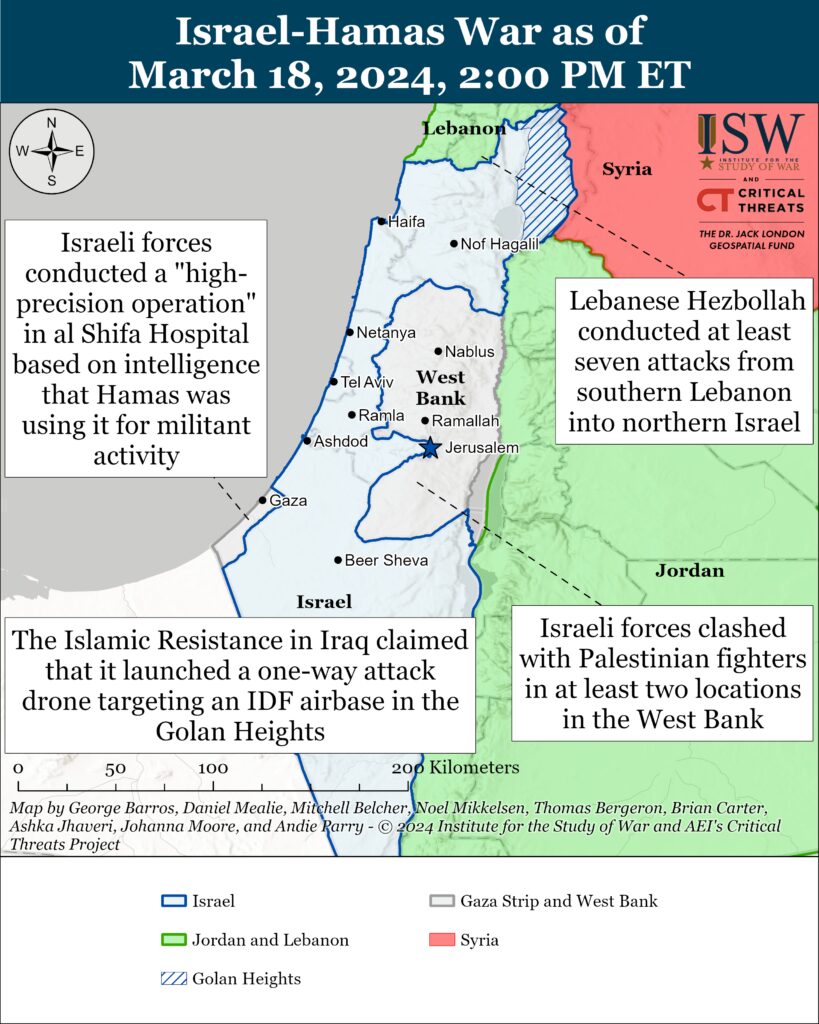
Gaza Strip
Axis of Resistance campaign objectives:
Erode the will of the Israeli political establishment and public to launch and sustain a major ground operation into the Gaza Strip
Degrade IDF material and morale around the Gaza Strip.The IDF Arabic-language spokesperson issued evacuation orders for parts of Rimal neighborhood and around al Shati Hospital in Gaza City on March 18.[xiv] The order requested residents immediately evacuate to the al Mawasi humanitarian zone in the southwest Gaza Strip.
The United States confirmed on March 18 that Israel killed Hamas military wing deputy commander Marwan Issa.[xv] US National Security Adviser Jake Sullivan told reporters that the rest of Hamas’ “top leaders are in hiding, likely deep in Hamas’ tunnel network.”[xvi] Issa worked closely with Hamas leader in the Gaza Strip Yahya Sinwar and Hamas military wing commander Mohammad Deif to plan the October 7 attack.[xvii]
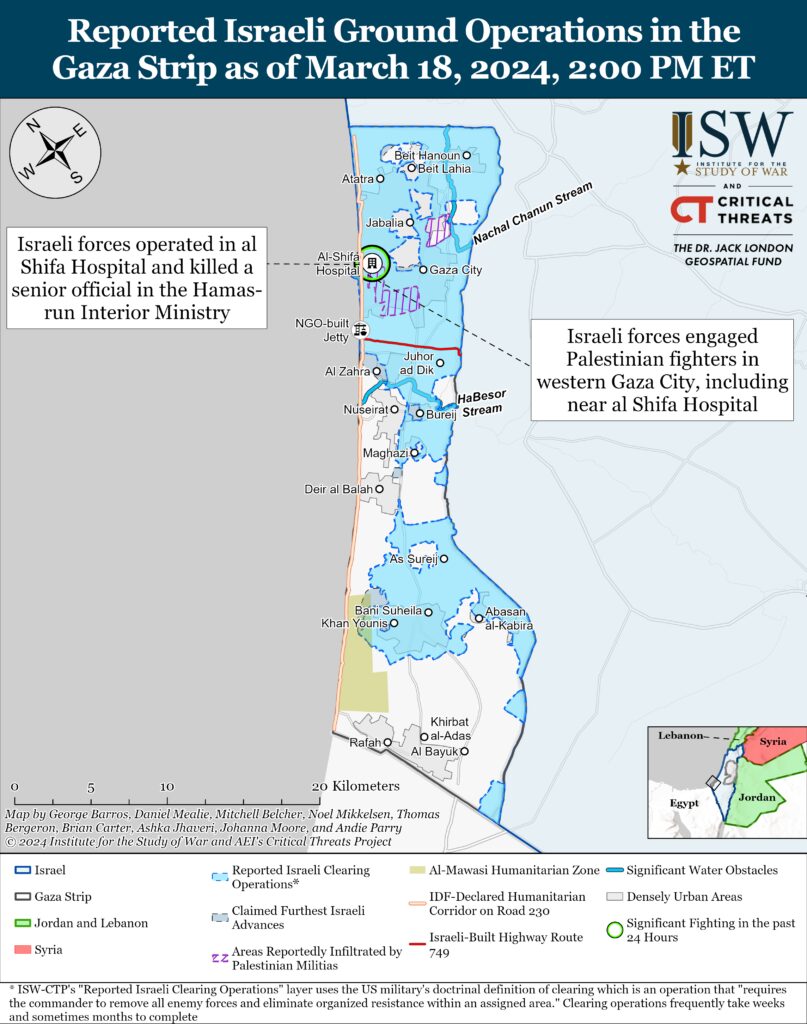
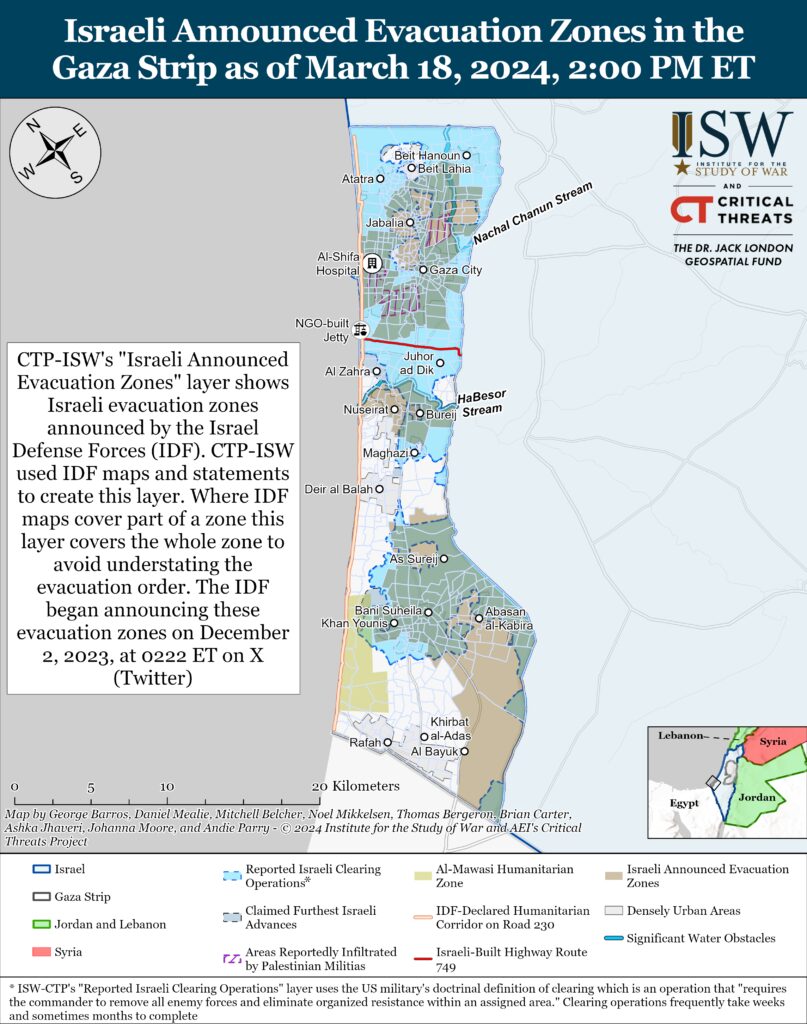
An unspecified Israeli official told Reuters on March 18 that Israel will send a high-level delegation to Doha for mediated negotiations with Hamas.[xviii] The official estimated that negotiations could take at least two weeks, noting the difficulties that Hamas’ delegation has in communicating with Hamas leaders in the Gaza Strip. An unspecified Israeli political official told Israeli media that the current negotiations are between Israel and Hamas’ leader for the Gaza Strip, Yahya Sinwar, rather than Hamas officials abroad who have “neither power nor decision-making ability.”[xix] Israeli Foreign Affairs Minister Israel Katz noted in reference to the Israeli delegation that Israel will not be able to fight Hamas if Palestinian civilians return to the northern Gaza Strip.[xx] Hamas has demanded that the IDF allow civilians to return to the northern Gaza Strip as part of ceasefire negotiations.[xxi] CTP-ISW previously reported how Hamas could use the return of civilians to the north to bring its own fighters back into the area.[xxii]
Unspecified US officials told NBC News on March 15 that Israel is considering using international private security contractors to protect aid convoys in the Gaza Strip.[xxiii] The officials said that Israel has already approached several security companies but did not specify which ones. Israeli media reported on March 8 that Israeli officials have discussed arming civilians in the Gaza Strip to provide security for aid convoys.[xxiv] The United States has warned Israel that a “total breakdown of law and order” is exacerbating the humanitarian crisis in the strip.[xxv] The absence of a local security force contributes to this issue.[xxvi]
The US officials also noted that the United States is considering using unspecified Palestinian security providers, that are unaffiliated with Hamas, to distribute humanitarian aid.[xxvii] The United States plans to construct a temporary pier on the coast of the Gaza Strip to facilitate the arrival and distribution of humanitarian aid.[xxviii] The United States has stressed that US service members will not operate on the ground in the Gaza Strip.[xxix]
Hamas Political Bureau Chairman Ismail Haniyeh and other Hamas officials met with a Chinese delegation in Qatar on March 17.[xxx] The Chinese ambassador to Qatar led the Chinese delegation. The two sides discussed the current situation in the Gaza Strip and ways to end the war.
Palestinian fighters did not conduct any indirect fire attacks from the Gaza Strip into Israel on March 18.
West Bank
Axis of Resistance campaign objectives:
Draw IDF assets and resources toward the West Bank and fix them thereIsraeli forces have engaged Palestinian fighters at least twice in the West Bank since CTP-ISW’s last data cutoff on March 17.[xxxi]
Israeli police have conducted training exercises in northwestern Israel in recent weeks to prepare for possible Palestinian militia attacks from Jenin and other areas in the West Bank into Israeli settlements.[xxxii] The Israeli Lowland Police Division commander said that Israeli police are ”prepared for any scenario and intrusion.” Israeli forces have conducted numerous operations against Palestinian fighters in Jenin since the Israel-Hamas war began, including a three-day operation in the Jenin refugee camp in December 2023.[xxxiii]
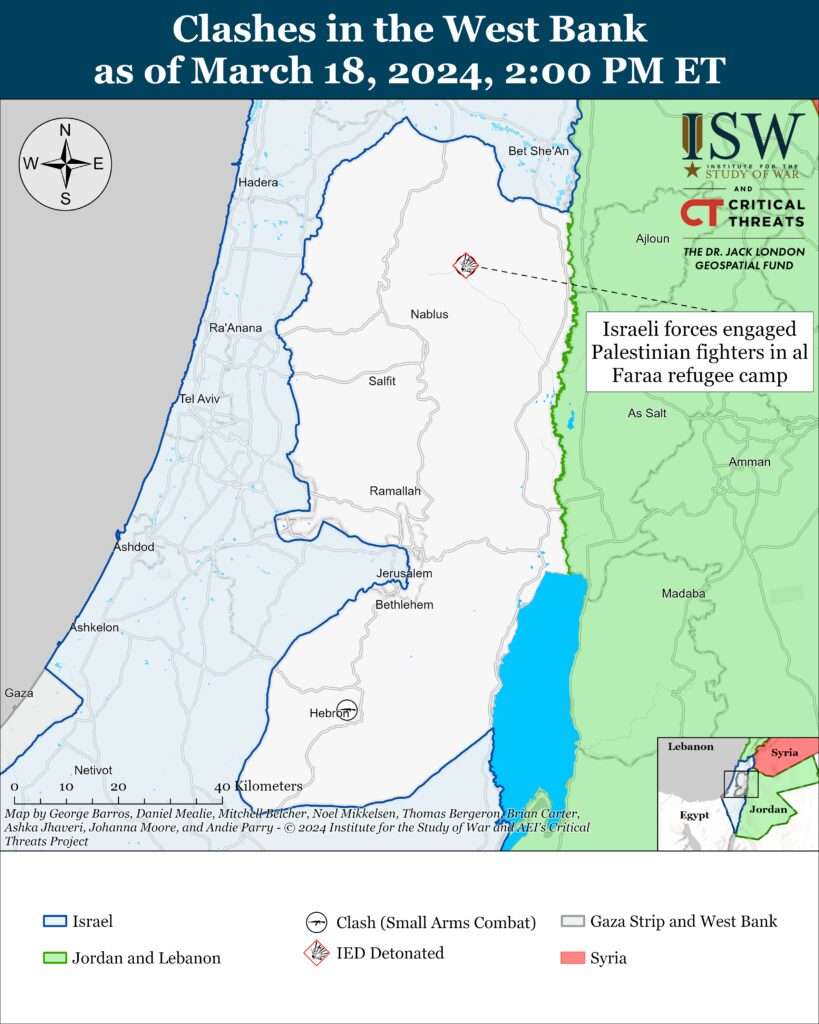
This map is not an exhaustive depiction of clashes and demonstrations in the West Bank.
Southern Lebanon and Golan Heights
Axis of Resistance campaign objectives:
Draw IDF assets and resources toward northern Israel and fix them there
Set conditions for successive campaigns into northern IsraelLebanese Hezbollah has conducted at least seven attacks from southern Lebanon into northern Israel since CTP-ISW’s last data cutoff on March 17.[xxxiv]
The Islamic Resistance in Iraq—a coalition of Iranian-backed Iraqi militias—claimed a one-way drone attack targeting an unspecified Israeli airbase in the Golan Heights on March 18.[xxxv] The group also claimed that it will “double” its attacks during the month of Ramadan, which began on March 10 and ends on April 9.[xxxvi] Jordanian air defenses detected “suspicious aerial movements” along the Jordan-Syria border on March 18.[xxxvii] A regional security source told Western media that the movements were likely missiles fired from Iraq by Iranian-backed militias.[xxxviii]
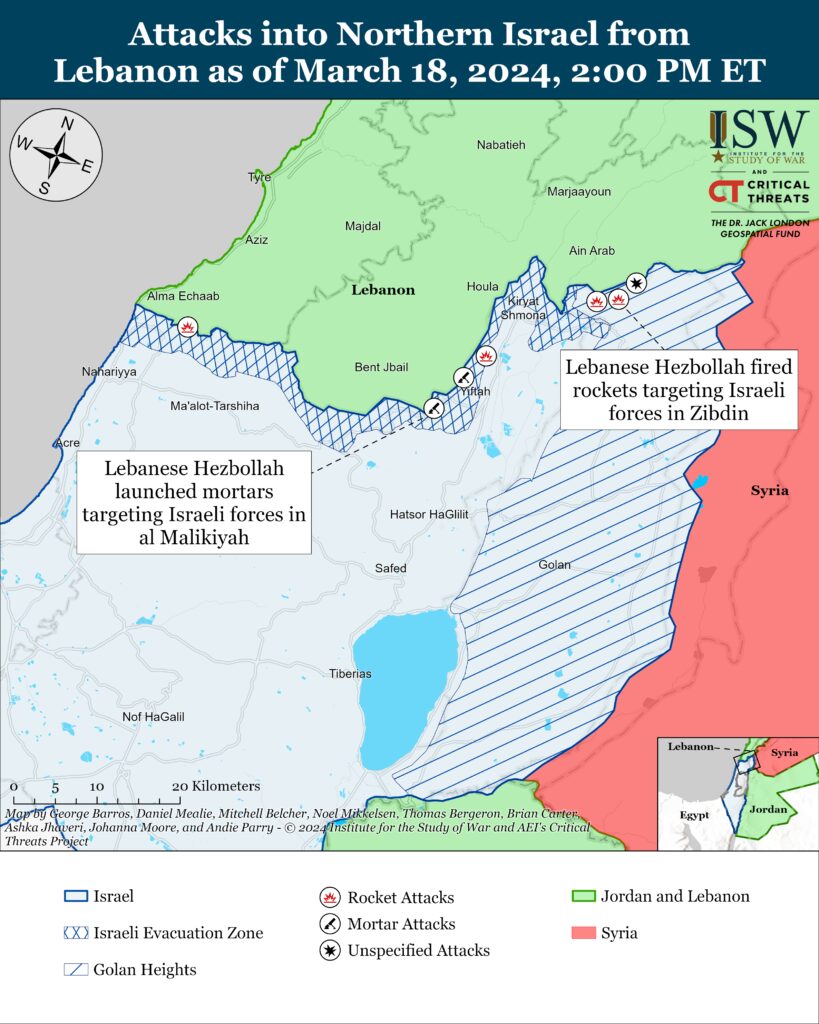
Recorded reports of attacks; CTP-ISW cannot independently verify impact.
Iranian sponsored attacks in the Middle East
Iran and Axis of Resistance
Axis of Resistance campaign objectives:
Demonstrate the capability and willingness of Iran and the Axis of Resistance to escalate against the United States and Israel on multiple fronts
Set conditions to fight a regional war on multiple frontsIraqi military spokesperson Major General Yahya Rasoul stated on March 18 that Iraq has sent military delegations to several unspecified countries to purchase anti-aircraft weapons.[xxxix] Iraqi officials have called for strengthening Iraq’s air defense systems in recent weeks, particularly in response to US airstrikes targeting Iranian-backed Iraqi militias. A member of the Parliamentary Security and Defense Committee, which is controlled by the Iranian-backed Badr Organization, claimed in early February 2024 that Iraq’s lack of advanced air defenses enables foreign airstrikes in Iraqi territory.[xl] The committee member further claimed that the United States “refuses” to supply air defense systems to Iraq so that it can continue its “aggression” against Iraq.[xli]
Iraqi Prime Minister Mohammad Shia al Sudani met with International Atomic Energy Agency (IAEA) Director General Rafael Grossi in Baghdad on March 18 to discuss the IAEA’s efforts to help Iraq develop a peaceful nuclear program.[xlii] Sudani and Grossi discussed Iraq’s previous efforts to establish nuclear reactors.[xliii] Sudani emphasized that nuclear energy should be a “source of prosperity” and should not be used to develop lethal weapons.[xliv] Grossi invited an Iraqi delegation to visit the IAEA headquarters in Vienna to “set out a road map for the Iraqi peaceful nuclear program.”[xlv] Grossi also invited Sudani to attend the Nuclear Energy Summit in Brussels on March 21.[xlvi] Iraq faces a power shortage and needs more energy to produce electricity.[xlvii] Iraq currently imports electricity from neighboring countries, such as Iran, which supplied approximately 25 percent of Iraq’s electricity in 2022.[xlviii]
Local Syrian opposition media reported on March 18 that the Islamic Revolutionary Guards Corps (IRGC) seeks to expand its military infrastructure at al Hamdan Airport in eastern Syria.[xlix] This reporting is consistent with Iran’s long-standing efforts to secure a permanent presence there. The IRGC has previously conducted training exercises at the airport.[l] The same Syrian opposition source claimed that the Lebanon-based construction company Jihad al Binaa will help the IRGC expand its operations at the airport.[li] Jihad al Binaa is a Lebanese Hezbollah-run and Iranian-funded construction company subject to secondary sanctions as a Specially Designated Global Terrorist entity.[lii] Iran uses military infrastructure in eastern Syria to secure a safe route through which it can facilitate Iranian weapons shipments to its proxies and partners in the region.
Houthi-affiliated media claimed on March 18 that the United States and the United Kingdom conducted 10 airstrikes targeting two Houthi-controlled areas in Yemen.[liii] The Houthi source said that the strikes occurred in al Fazah and al Jabanah in Hudaydah Governorate. Neither the United States nor the United Kingdom have confirmed the strikes at the time of this writing.
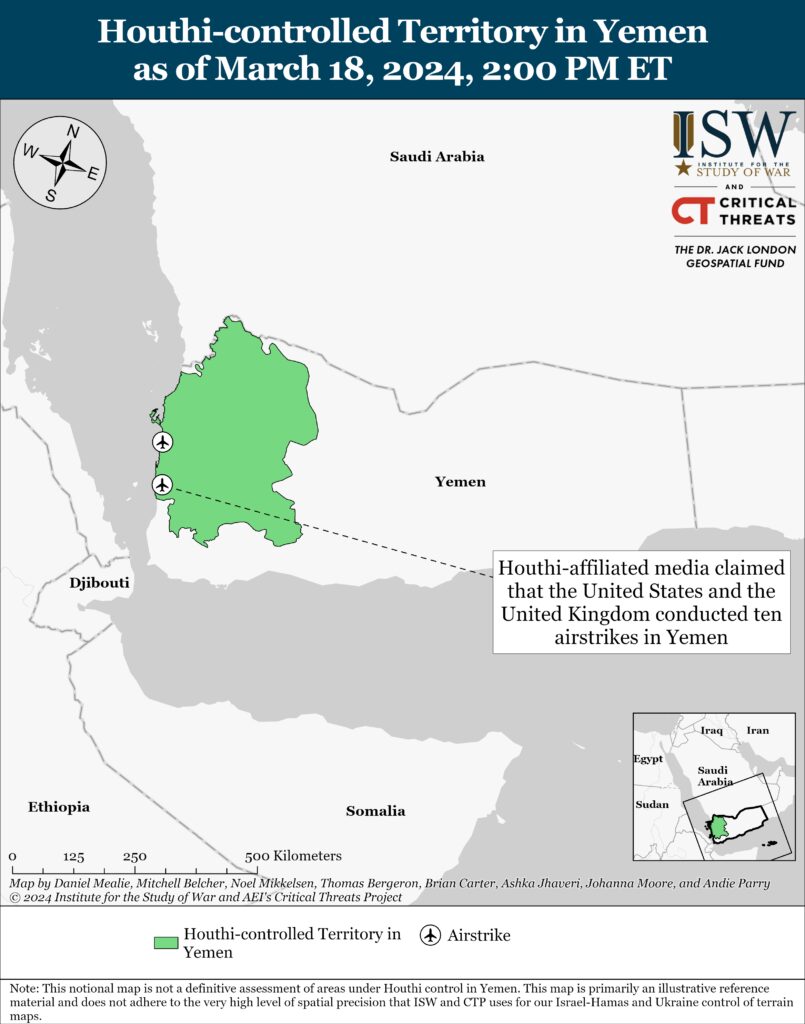
The Wall Street Journal reported on March 17 that Niger ended its counterterrorism cooperation with the United States after US officials accused Niger of secretly exploring a deal to allow Iran access to its uranium reserves.[liv] Niger is the seventh largest uranium producer in the world.[lv] Pentagon spokesperson Sabrina Singh stated that a US delegation traveled to Niger last week to express numerous concerns, including regarding Niger’s potential relations with Iran and Russia.[lvi]
CTP previously assessed that it is possible, though unlikely, that Iran attempts to obtain Nigerien uranium.[lvii] The Nigerien junta has not indicated that it intends to replace the French- and Canadian-based mining companies that currently own the majority shares in nearly all Nigerien uranium mines, including the only active one.[lviii]
 Eurasia Press & News
Eurasia Press & News
